New Faculty Join the Allegheny Community
Ten new full-time professors joined the Allegheny College faculty in fall 2017. We asked them to share some brief background information and another interesting fact or two about their lives so the community could get to know them better.
Christopher Finaret, visiting instructor of economics
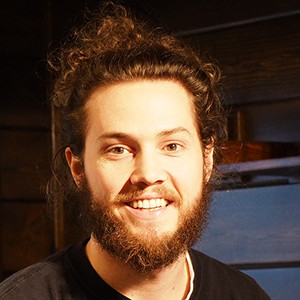
Christopher Finaret served tours as U.S. diplomat in both Colombia and the Democratic Republic of the Congo. His academic and teaching interests include the evaluation of development policy and programming.
Finaret earned his undergraduate degree in economics from the University of California, San Diego, and then a master’s degree in the field from the London School of Economics. And he holds another distinction: he’s a former All-American Ultimate Frisbee player.
Nicole Gross-Camp, visiting assistant professor of environmental science
Nicole Gross-Camp describes herself as an interdisciplinary environmental scientist interested in influencing long-term, equitable conservation for people and the planet. She holds a bachelor’s in biology from Earlham College and a master’s degree and Ph.D. in environmental studies from Antioch New England Graduate School.
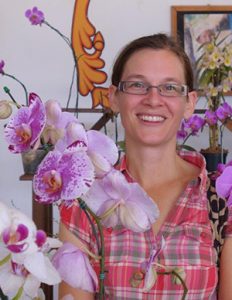
During her doctoral work, Gross-Camp lived with her husband and 20-month-old daughter in the middle of an Afromontane forest in Rwanda. (The couple met while volunteering at a primate sanctuary in Nigeria.) The family returned to Rwanda several years later, along with their son, to live in the town of Butare for a year.
For the last eight years, Gross-Camp lived and worked at the University of East Anglia School of International Development in Norwich, United Kingdom. Her research explores conservation and development interventions and their interactions within society and larger economic context with implications for sustainable and just outcomes. She draws methodologies from ecology, social anthropology, development studies and human geography.
In particular, Gross-Camp focuses on African forests and communities living in or around such forests. “My focus on these areas stems from the significant societal and ecological roles that they play in the lives of millions of people,” she says. “I believe that understanding the role of forest ecosystems in people’s lives is a key step in our ability to ensure a just and sustainable future.”
A keen gardener, Gross-Camp is eager to get involved in Allegheny’s community gardens. “I am an outdoor enthusiast and looking forward to returning to a part of the world where seasons are distinct,” she says. “I have not experienced a proper winter (i.e. with snow!) since I left the States in 2009.”
Anna Hahn-Buerger, Max Kade Writer-In-Residence
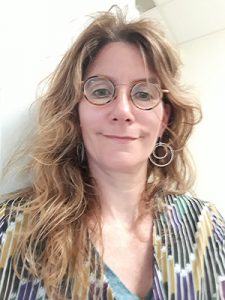
Anna Hahn-Buerger says she wants to bring “a piece of Germany” to the students she is teaching at Allegheny, helping them to become familiar with her language and her country and its literature.
Hahn-Buerger received her Magister Artium in German literature at the Universität Hamburg. As a student, she worked as a creative writing teacher in adult education and as a teaching assistant at her university.
Hahn-Buerger has published three novels and two collections of short stories. Her first novel, Kuerzere Tage (Shorter Day), has been translated into English and is available as an e-book. “As far as my own work is concerned, I’m looking forward to using the treasures of Pelletier Library in order to work on my new novel, which is partly occupied with German immigration to the United States,” she says.
Reading and writing are her favorite interests, but Hahn-Buerger says she also enjoys horror movies and stories. While she adores big motorbikes, Hahn-Buerger plans to rely on a different means of transportation while in the U.S.
“I can’t drive a car or any other vehicle although I took lots of driving lessons in Germany,” she says. “Due to this fact, I will have to discover Meadville on foot, or as we say in German ‘auf Schusters Rappen’ (by the shoemaker’s horses). For a writer this is not so bad because walking gives me the opportunity to discover many things you can’t get hold of while you sit in a car.”
Jennifer Julian, visiting fiction writer-in-residence
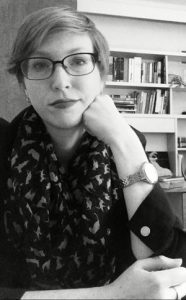
Jennifer Julian has written fiction and non-fiction and taught writing workshops in both, as well as classes in literature and film. She has been a college educator for seven years and earned a B.A. in English from the College of Charleston, an MFA in fiction from UNC Greensboro, and a Ph.D. in English from the University of Missouri.
Recently, Julian has been researching speculative fiction, specifically political and ecological dystopias. “I’m also interested in posthumanism,” she says, “since speculative genres have a way of investigating how everyday technologies are changing the definition of what it means to be a person, human or non-human, man or woman.”
Julian finds connections across the different genres in which she writes. For example, she says she sees some crossover between speculative fiction and personal essays since there is an exploratory, experimental nature to both.
For Julian, learning about popular science and science history is a “fruitful source of inspiration for story ideas.” She also likes to draw (she’s creating a comic with a fellow fiction writer), and she’s very fond of cats. “I have a large orange Maine Coon who moved with me here all the way from Missouri,” Julian says.
Aravind Mohan, assistant professor of computer science
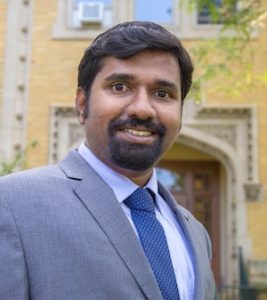
Aravind Mohan recently earned his doctorate in computer engineering from Wayne State University in Detroit after previously earning his master’s degree in computer science from Governors State University in University Park, Illinois. His dissertation studied the challenges of big data by using workflow-driven techniques that leverage the cloud-computing environment.
Mohan has published several research articles in peer-reviewed journals, including the International Journal of Big Data. He is a member of the Institute of Electrical and Electronics Engineers and the Association for Computing Machinery.
His research focuses on big-data management and cloud computing. His broader areas of interests are services computing, online education services, and information retrieval. His research passion is driven by developing the most usable and scalable data-centric tools and techniques that collect some meaningful information from big data in a time and cost-efficient manner, and thereby have an impact on society as a whole.
Mohan says he is passionate about combining theory and practice while teaching computer science courses. From past industry experiences as a software engineer in banking and healthcare, he shared his knowledge on real-world projects with the students that he taught and mentored earlier.
Mohan enjoys traveling and exploring new places and cultures. “It’s tricky for me to travel far because I get lost while journeying to the simplest of places. I was able to address this issue with the help of GPS technology,” he says. A lover of the outdoors, he finds walking and biking to be the best ways to explore the wonders of nature.
Sharane Simon, visiting assistant professor of geology
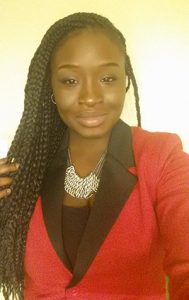
Sharane Simon earned her Bachelor of Science degree in petroleum geoscience from the University of the West Indies in Trinidad and Tobago. She received her doctorate in earth sciences (sedimentology and mineralogy) from Dalhousie University in Halifax, Canada.
“For my doctoral work, I partnered with researchers from the Smithsonian Institute and conducted a multidisciplinary study of an ancient fine-grained unit in north-central Texas,” she says.
She has been a teaching assistant and writing tutor at Dalhousie University.
“I aim to use my knowledge and skills such as field/subsurface mapping techniques, seismic interpretation, and petrography to study ancient, fine-grained dryland river systems,” Simon says.
“My unusual combinations stem from my work experience. I have worked on gas and light oil projects in Trinidad and Tobago and oil sands in Canada,” she says. “At the age of 21, I proposed many oil wells, which were drilled successfully onshore Trinidad. I have also worked with the Black Business Initiative in Halifax to identify energy opportunities through which Black, Nova Scotian businesses and individuals can become a vibrant part of the existing supply chain. I also participated in a board mentorship program, which exposed me to the inner workings of a board and I gained formal training in governance and leadership.”
Jan Starczewski, visiting assistant professor of Modern and Classical Languages
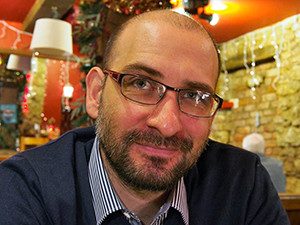
Professor Jan Starczewski has been around the education business, having taught at the middle school and university levels in France and the United States. His higher-education résumé includes teaching at Hartwick College, the University of Memphis, the University of Nice in France, and at the University of Wisconsin at Madison.
He holds a bachelor’s degree in English from the University of Nice-Sophia-Antipolis, France, a master’s in French literature from the University of Memphis, and a master’s in European history focusing on the early modern period (prior to the French Revolution) from the University of Wisconsin at Madison. He will defend his dissertation, “Reevaluating Christianity in the Writings of Rousseau and Diderot,” in December.
“My work focuses on the tension between faith and reason; the seeming antithesis between the revealed religion of the theologians and the natural religion of the French philosophes,” he says. “The traditional narratives of The Enlightenment, particularly in France, depict it as the era of the birth and apex of the secular age. Alongside other historians, I challenge this notion, and show that authors such as Voltaire, Diderot, and Rousseau were heavily influenced by theological debates of their time, and that their critique of Christianity is more aimed at institutions rather than attacking the essence of it. Thus, I argue that ‘modernity,’ the morning after the French Revolution did not see an annihilation of religion, but rather a transformation of it.”
Among Starczewski’s interests are current events in the world, education and social justice, cooking, and boxing. “I try to keep a curious and sensitive mind about many things,” he says.
“I used to work in fancy hotels and restaurants in the South of France, and have met many celebrities, including Johnny Depp, Bono, Eric Clapton, and many others,” Starczewski says.
Kathryn Tamulonis, assistant professor of geology
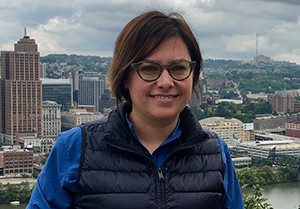
Kathryn Tamulonis earned her bachelor’s degree in geology from Dickinson College and her doctorate in Earth and atmospheric sciences from Cornell University.
“Between undergraduate and graduate school, I worked for two years a geologist at an environmental consulting firm,” she says. “I had a two-year fellowship with the U.S. Geological Survey while at Cornell. Following graduate school, I worked for six years in the oil and gas industry. I taught at Slippery Rock University during the 2016–2017 academic year.
“I use sedimentary rocks to understand earth processes and predict natural resource occurrence (natural gas and oil). In particular, I utilize subsurface data (well and seismic data), and rock outcrops to understand how rocks change in sedimentary basins in order to provide insight into how tectonic processes, sea-level, and paleoclimate affect sedimentary rock distribution. I am also interested in landslides and groundwater quality.”
Tamulonis almost chose to attend art school following high school. “I enjoy sketching and painting, but that took a back seat for a bit during graduate school and my time in the oil /gas industry. I now have two small children, and they love when I sketch dinosaurs for them.”
Tamulonis says she is a Philadelphia Eagles football fan and got engaged on the jumbotron at an Eagles home game against the Denver Broncos. The Eagles won!
Qianying Zhang, visiting assistant professor of economics
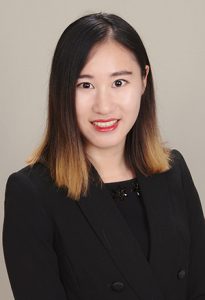
Qianying “Jennie” Zhang earned her bachelor’s degree in economics from East China Normal University, her master’s in economics from the University of Illinois, Urbana-Champaign, and her doctorate in economics from Florida International University. She also taught Measurement Analysis for Business and Economics at Florida International University last year.
Her areas of expertise include econometrics, statistics, finance, macroeconomics, and general economics. Her research specialties include empirical asset pricing, applied econometrics, and macroeconomics.
“My unusual combinations are hip-hop dancing and finance,” she says. “I like logical reasoning, and murder-mystery and detective books.”